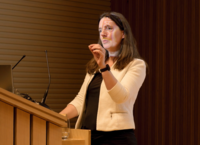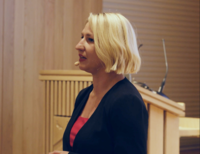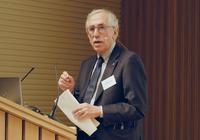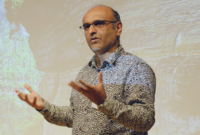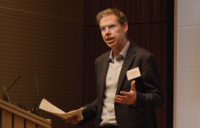Strategic Research Fund
The Strategic Research Fund is expanding the University’s research capacity and transforming the research landscape.
The Strategic Research Fund (SRF) was established in 2019 to invest income from Oxford's research commercialisation activities into major new research initiatives, by making matched funding and/or significant investments that are beyond the resource of individual divisions and departments.
The SRF is transforming Oxford's research capacity and capability in strategically important areas, and enabling timely and effective responses to global challenges.
‘Three years in, it’s clear that
Oxford Net Zero is having an
impact in the world – and that this
would not have happened without
funding from the University’s
Strategic Research Fund.’
Professor Myles Allen, Oxford Net Zero

SRF News
Oxford EARTH (Ensuring equitable Access to sustainable Resources for a Thriving Habitat) will bring together researchers from nine departments across the University to address the challenges in natural resources underpinning the net zero energy transition. Hosted by the Department of Earth Sciences, the programme will focus on critical raw materials needed for the generation, storage, and transmission of renewable energy, as well as the social license required for their responsible extraction. Through the appointment of new research positions and cross-departmental collaboration, Oxford EARTH will drive cutting-edge solutions for sustainable and equitable resource use. The programme is led by Prof Mike Kendall.
Further information about Oxford EARTH:
CASSM will be hosted by the Department of Politics and International Relations, in collaboration with Nuffield College, the departments of Economics, Law, Sociology, Social Policy and Intervention, and the Oxford Internet Institute. Via the appointment of five new APNTF posts and one RSIV, CASSM will enable a step-change in Oxford's interdisciplinary advanced social sciences methods capability. The Centre's director will be Professor Ben Ansell (Politics).
Established SRF-funded Initiatives
SRF funding enabled Oxford to fill a gap in expertise by attracting outstanding leader Professor Dame Molly Stevens and her extensive team. Professor Stevens has been appointed as John Black Professor of Bionanoscience and Co-Deputy Director of the Kavli Institute.
Watch a talk from Molly Stevens:
SRF investment is helping Digital Scholarship@Oxford (DiSc) transform Oxford’s capacity to maximise the potential of digital scholarship, and ensure it is at the heart of research and engagement in Humanities and, in the longer term, of all academic disciplines. DiSc's Academic Director is Professor David De Roure.
Watch a talk from David De Roure:
Oxford Net Zero (ONZ) aims to operationalise net zero with social and environmental integrity, advancing both climate action and sustainable development. SRF investment has created a highly interdisciplinary team, which brings together experts from across ten departments and a growing network of international partners. The Research Director of Oxford Net Zero is Professor Sam Fankhauser; its Executive Director is Dr Steve Smith.
Watch a talk from Kaya Axelsson, Head of Policy and Partnerships at Oxford Net Zero:
SRF investment is helping Oxford Global Health (OGH) draw together and showcase the breadth of the University’s work in global health from across all four academic Divisions, highlighting cross-disciplinary approaches and partnerships that support solutions to global health challenges. Oxford's Director of Global Health is Professor Alan Bernstein.
Watch a talk from Alan Bernstein:
SRF investment played a crucial part in securing investment from the Leverhulme Trust, and has funded the purchase of cutting-edge technology to rapidly provide ecological baselines for research. See Leverhulme Centre for Nature Recovery. Professor Yadvinder Malhi is Director of the Leverhulme Centre for Nature Recovery.
Watch a talk from Yadvinder Malhi:
SRF investment supported the foundation of The ZERO Institute to position Oxford as a centre of research excellence and leadership on the transition to zero-carbon energy. The investment has brought together researchers from across the University and supported new appointments to augment The ZERO Institute’s research portfolio. Zero's Director is Professor Paul Shearing.
Watch a talk from Paul Shearing:
SRF investment is enabling the University of Oxford to lead in the development of new insights and science on quantum, and play a crucial role in creating a quantum-enabled regional and national economy. See Oxford Quantum Institute (OQI) .
SRF funding will underpin and enable the growth of a centralised pool of experienced RSEs on open-ended contracts, providing professional and broad-ranging software development support and training to the University’s research community. See Oxford research Software Engineering (OxRSE). The Director of OxRSE is Professor David Gavaghan; the Head of the Oxford RSE Group is Dr Martin Robinson.
SRF investment will help us to build capacity in the research field of using sunlight to power production of basic chemicals either directly through photochemistry or indirectly by coupling photovoltaic electricity generation with chemistry. The SRF investment will build capability and capacity across the sustainable chemistry and materials science community of researchers.
SRF investment will advance the field of Biophysics at the University of Oxford, by enabling the appointment of world-renowned single molecule biophysicist Nynke Dekker as the inaugural Oxford Professor of Biophysics.
Four Turing AI World-Leading Researcher Fellowships (co-funded with UKRI) in: deep learning (Professor Philip Torr); human-machine collaboration (Professor Alison Noble); large-scale agent-based modelling (Professor Mike Wooldridge); and machine learning for next generation drugs and food (Professor Michael Bronstein).
Strategic Research Fund Showcase Event 2024

CLICK HERE FOR GUIDANCE ON HOW TO APPLY TO THE SRF
Please get in touch with a divisional contact if you are interested in applying to the SRF:
If you have general queries about the SRF, please contact the Strategic Research Development Team in Research Services

